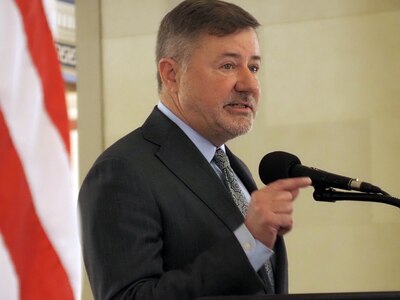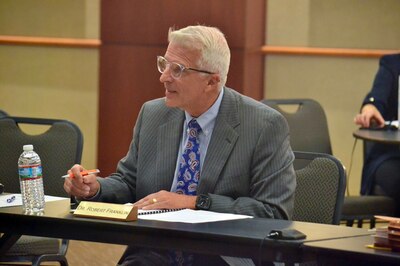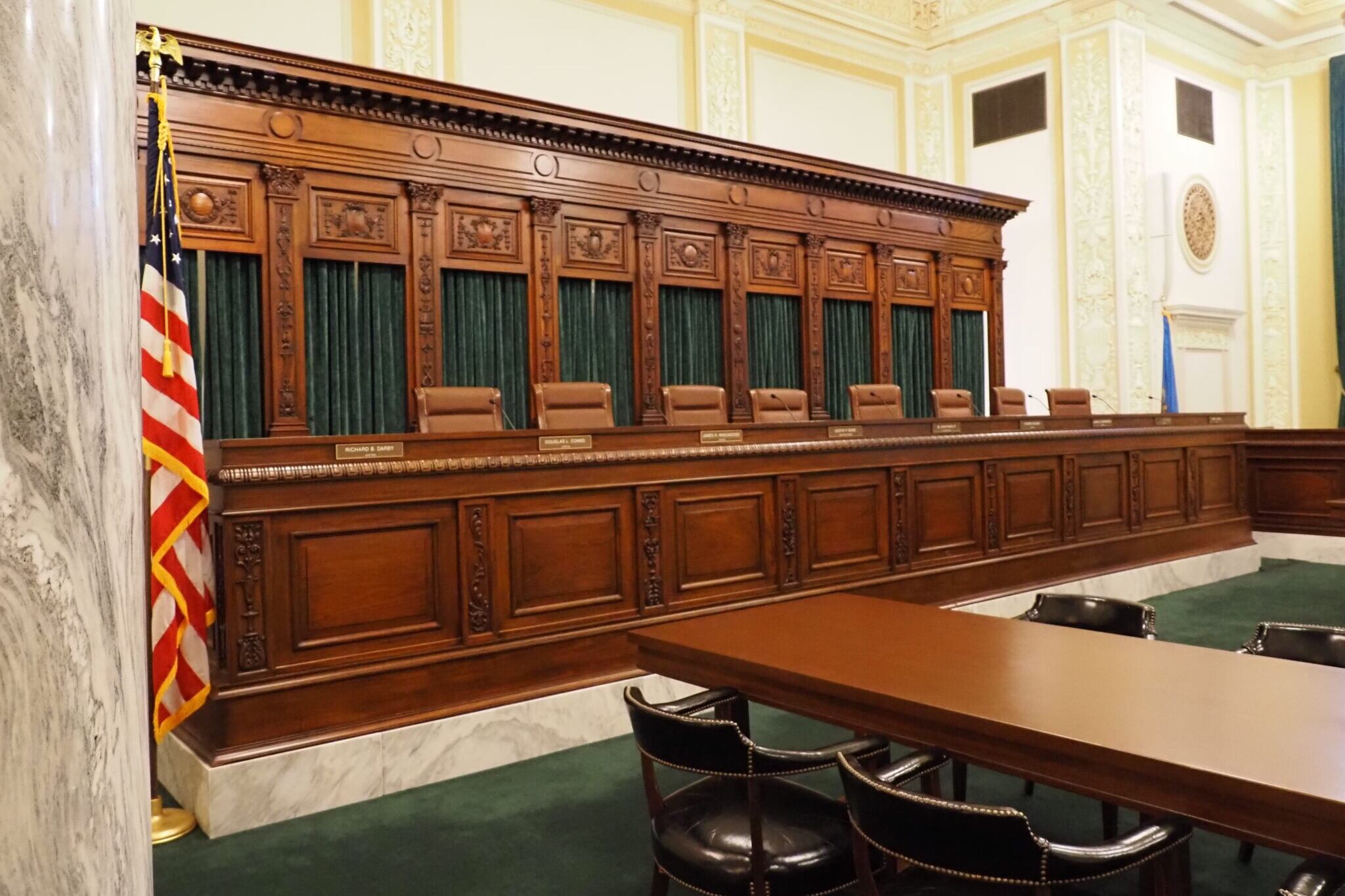This story was originally published by Oklahoma Voice and is republished under a Creative Commons license.
OKLAHOMA CITY — Three months before the nation’s first religious charter school is scheduled to open in Oklahoma, the state’s attorney general urged the state Supreme Court to void the school’s founding documents, contending its existence “eviscerates the separation of church and state.”
Attorney General Gentner Drummond argued before the state’s nine justices on Tuesday that permitting a Catholic charter school would violate state law and the Oklahoma Constitution, both of which require that public schools be “free of sectarian control.”
Attorneys representing the school’s interests contend charter schools are privately run entities that aren’t subject to the same laws that govern public schools.
St. Isidore of Seville Catholic Virtual School would be the first state-funded charter school in the country to teach and abide by a specific religious faith. It plans to open July 1 and have its first day of school Aug. 12 with enrollment up to 500 students.
The Archdiocese of Oklahoma City and the Diocese of Tulsa created the school to provide a free, online Catholic education throughout the state. Students would be required to attend mass, learn Catholic doctrine, and follow school rules informed by Christian beliefs.
The Oklahoma Statewide Virtual Charter School Board voted 3-2 in June to approve the school’s creation.
Drummond said the board members who voted in favor of the school “betrayed their oath of office.” He asked the state Supreme Court to overturn the decision.

The attorney general said after the hearing he expects the Court to rule in the case before St. Isidore opens July 1. If the justices decide against him, Drummond said he “would be committed to appealing it to the United States Supreme Court.”
Attorneys representing the school and the state board said charter schools, including St. Isidore, aren’t public entities subject to the state Constitution, though they chiefly rely on state funding.
State law defines a charter school as a “public school established by contract” with a state agency, a higher education institution or a local school district. It also mandates that charter schools be nonsectarian.
But the state doesn’t operate St. Isidore, said Philip Sechler, senior counsel for Alliance Defending Freedom, a national Christian law firm representing the Statewide Virtual Charter School Board.
He said the school is “privately operated” and self-sufficient with its own bylaws, staff and curriculum.
“They’re a Catholic school, but they welcome everyone,” Sechler said. “Nobody is required to go to St. Isidore. That’s very important. It’s an option among many.”
Private entities who want to establish a charter school shouldn’t be excluded from state funding on account of religion, Sechler said.
Recent U.S. Supreme Court rulings affirmed that publicly funded programs, like vouchers to private schools and public grants, can’t leave out certain private organizations just because they’re religious.
Drummond said there’s “an ocean between those two issues.” Religious entities often receive taxpayer funds to help them offer a public benefit, such as a church-affiliated hospital, but he said public education is a core service the state provides.
Related: Could religious charter schools upend American education? A Chalkbeat explainer.
St. Isidore is a joint venture between the church and the state — two entities who agreed to enter into a charter contract with each other to found the school, Drummond said.
“My sense of it is that it will be difficult for the Court to not grant my request,” the attorney general said after the hearing.
Justice Noma Gurich seemed skeptical of the idea that a state-funded charter school is free of constitutional obligations.
“Where is the choice for Oklahoma taxpayers not to support the Catholic Church?” she asked during the hearing.
In a similar line of inquiry, Vice-Chief Justice Dustin P. Rowe asked whether taxpayers are not “indirectly supporting the Catholic Church” by funding the school and questioned how this wouldn’t violate the state Constitution.
The Court’s most experienced justice, Yvonne Kauger, asked bluntly, “Are we a test case?”
Many, including Drummond, have assumed St. Isidore’s backers hoped from the start that the case would land in front of the U.S. Supreme Court.
“It sure looks like it,” Kauger said.
Sechler and Michael McGinley, a D.C.-based attorney representing St. Isidore, told the justices the Oklahoma school isn’t intended that way.
Justice Dana Kuehn appeared to be more receptive to the school’s stance.
She interjected during the hearing to ask whether public schools are “establishing a type of religion” by teaching about concepts, like evolution, that contradict some religious beliefs.
“Do you have to give parents a choice on the other side?” she asked. “Does that open the door for a charter school to have a religious component?”
Despite arguments that the school is private, St. Isidore’s teachers will qualify for a public pension and state-funded insurance benefits. The school agreed to follow state laws requiring open records, open meetings, yearly academic testing and a minimum number of days in the school year, among other regulations.
“They are a public school,” Drummond said after the hearing. “If it walks like a duck, quacks like a duck, looks like a duck, it’s a duck. It’s a public school. I think that they were hoping that the Supreme Court would bite on that distinction. I just don’t see the majority of the Court buying that argument.”
Sechler said the school abides by those state regulations only because it agreed to do so in its charter contract, not because it is legally obligated to like traditional public schools.
The chairperson of the Statewide Virtual Charter School Board, Robert Franklin, said he has always believed charter schools to be public.
Franklin and William Pearson were the only two board members to vote against opening St. Isidore. They also were the only two board members present at Tuesday’s hearing.

The three others who voted in favor of St. Isidore — Brian Bobek, Scott Strawn, and Nellie Tayloe Sanders — have vacated their seats on the board.
Franklin said it was an “odd position” for him and Pearson to listen to attorneys arguing for a school they opposed.
“At the end of the day, these questions need to be resolved,” he said afterward. “And once the questions are resolved, then we can move forward.”
A separate lawsuit filed by Oklahoma faith leaders, education advocates and parents is challenging the Catholic charter school. That case is pending in Oklahoma County District Court.
Nuria Martinez-Keel covers education for Oklahoma Voice.
Oklahoma Voice is part of States Newsroom, the nation’s largest state-focused nonprofit news organization.






